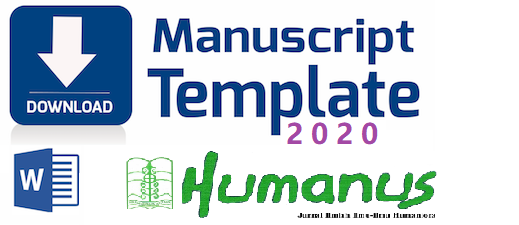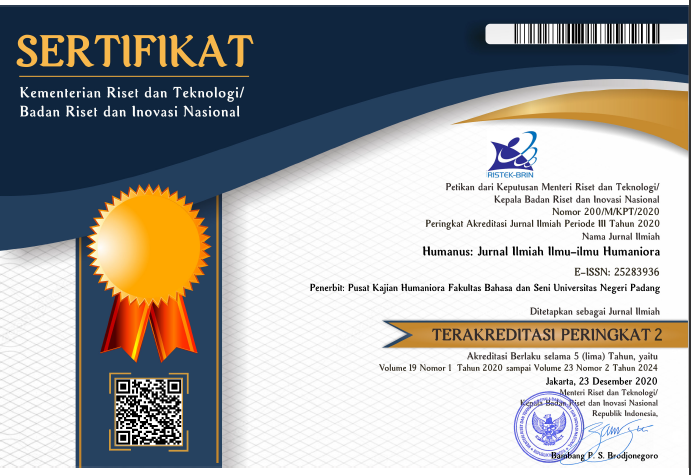REGISTER AND POWER IN INDONESIAN ONLINE GAME (A SOSIOLINGUISTIC STUDIES)
 ),
), (1) Universitas Gadjah Mada
 Corresponding Author
Corresponding Author
Copyright (c) 2019 Humanus
DOI : https://doi.org/10.24036/humanus.v18i2.107169
Full Text:
 Language : id
Language : id
Abstract
The use of language variations in online games are determined by several factors such as time, place, and situation that results in the emergence of the practice of power. This arises because the production of text is strongly influenced by the context in which in a game, there is a need to win the game. The purposes of this paper is to reveal the forms of registers and their applications that shape the practices of power within them. Data obtained from observations in the game. The data were then analyzed using a sociolinguistic approach by using a semiotic triangle of Halliday as the blade of analysis. The results of this paper indicate that the use of registers focuses on interaction among team and another team members in mocking each other. The conclusion of this paper is that the player who has the best ability, has the authority to manage other gamer's games and can mock his opponent team members as well as his own team.
References
Bawa, P. (2018). Massively multiplayer online gamers’ language: Argument for an m-gamer corpus. The Qualitative Report, 23(11), 2714-2753.
Bytheway, J. (2015). A taxonomy of vocabulary learning strategies used in massively multiplayer online role-playing games. CALICO Journal, 32(3), 508-527.
Dietrich, David R. (2013) “Avatars of Whiteness: Racial expression in video game characters.”
Sociological Inquiry, 83(1), 82-105.
Eklund, L. (2011). Doing gender in cyberspace: The performance of gender by female World of Warcraft players. Convergence, 17(3), 323–342.
Ensslin, A. (2011). The language of gaming. Basingstoke and New York: Macmillan International Higher Education.
Fairclough, N. (1989). Language and power. London: Longman.
Foucault, M. (1982). The subject and power. In H. L. Dreyfus & P. Rabinow (Eds.), Michel Foucault: beyond structuralism and hermeneutics (pp. 208-226). Chicago: The University of Chicago Press.
Gee, J.P. (2014). Unified Discourse Analysis: Language, Reality, Virtual Worlds, and Video Games. London: Routledge
Gregory, M. and Carroll, S. (1978). Language and situation: Language varieties and their social contexts. London: Routledge.
Halliday, M.A.K. (1978). Language as social semiotic. The social interpretation of language and meaning. London: Edward Arnold.
Halliday, M.A.K. and Hasan R. (1990). Language, context, and text: aspects of language in a social-semiotic perspective. Oxford: Oxford University Press.
Holmes, J. (2013). An Introduction to Sociolinguistics. London: Routledge.
Malisi, Syabro & Suharsono, Suharsono & Setiawan, Slamet. (2017). Language and Identity in Online Gamer Community. Journal of English Language and Literature. 8. 617. 10.17722/jell.v8i2.245.
Mesthrie, R. (2009). Introducing sociolinguistics. Edinburg: Edinburgh University Press.
Neely, E.L. (2019) The ethics of choice in single-player video games. In: Berkich D., d'Alfonso M. (eds) On the Cognitive, Ethical, and Scientific Dimensions of Artificial Intelligence. Philosophical Studies Series, vol 134. Springer, Cham
Purnomo, SF.L.A., Purnama, SF.L.A., Untari, L. (2019). Prosthetic translation: Retranslations of video game remakes and remasters refute retranslation hypothesis. Humanus. Vol 18, No 1 (2019). https://doi.org/10.24036/humanus.v18i1.103507
Rusaw, E. (2011). Language and social interaction in the virtual space of World of Warcraft. Studies in the Linguistic Sciences: Illinois Working Papers 2011: 66-88.
 Article Metrics
Article Metrics
 Abstract Views : 3857 times
Abstract Views : 3857 times
 PDF Downloaded : 242 times
PDF Downloaded : 242 times
Refbacks
Copyright (c) 2019 Humanus

This work is licensed under a Creative Commons Attribution-NonCommercial 4.0 International License.










